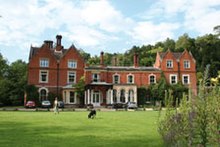Field Studies Council
| Formation | 1943 |
|---|---|
| Founded at | Natural History Museum, London, England |
| Registration no. | 313364 |
| Legal status | Charity |
| Purpose | First Hand experience in the Outdoors |
| Headquarters | Shrewsbury, England |
| Website | www |

Field Studies Council is an educational charity based in the UK, which offers opportunities for people to learn about and engage with the outdoors.
History
[edit]It was established as the Council for the Promotion of Field Studies in 1943[1] to provide opportunities for school children to study plants and animals in their natural environment.[2] It subsequently became a nationwide provider of outdoor education, and has established a network of field centres providing facilities for people wanting to study natural history, ecology and the environment.[1][3]
Activities
[edit]Field Studies Council provides outdoor educational residential or day visits from the organisation's centres, and other outreach areas, including London parks.
The centres include:
- Amersham Field Centre, Buckinghamshire[4]
- Bishops Wood, Worcestershire[5]
- Blencathra, Cumbria[6]
- Castle Head, Grange-over-Sands, Cumbria[7]
- Dale Fort, Pembrokeshire[8]
- Epping Forest, Essex [9]
- Flatford Mill, Colchester[10]
- Juniper Hall, Surrey[11]
- London Parks: Bushy Park, Greenwich Park and Regent's Park[12]
- Margam Park, Neath Port Talbot[13]
- Millport, Island of Great Cumbrae, North Ayrshire[14]
- Nettlecombe Court, Somerset[15]
- Preston Montford, Shropshire[16]
- Rhyd-y-creuau, Conwy [17]
- Slapton Ley, Devon [18]
The Field Studies Council creates a programme covering a wide variety of outdoor education, including fieldwork opportunities in geography and biology, providing fieldwork opportunities to allow students to investigative practical skills and to be given the chance to evaluate and analyse data they collect themselves, and data already held by the organisation.[19]
The Field Studies Council also publishes fold-out charts and guides.[20][21] BioLinks South East and BioLinks West Midlands are lottery funded schemes set up to strengthen UK biological recording.[22]
With the goal of promoting and improving geography fieldwork, the Field Studies Council has entered into a partnership with The Geographical Association. Together, they work towards creating cases for geography and fieldwork within policy, and creating resources for education and career development.[23]
Partnerships projects include:
- Forgotten Places: Greening Coastal Towns and Cities[24]
- The Generation Green project Access Unlimited[25]
- Mission:Invertebrate[26]
- Our Bright Future[27]
- Nature Friendly Schools[28]
- Work to change policy within education to include environmental studies to school and college students[29]
References
[edit]- ^ a b Miyake, Shiho; Nogami, Tomoyuki (September 2005). "The History of the Field Studies Council (FSC) in Britain : The Creation Period as the Council for the Promotion of Field Studies (C.P.F.S.) (1943-1955)". Journal of Science Education in Japan. 29 (3): 196–212. doi:10.14935/jssej.29.196.
- ^ Barrett, John H (September 1987). "The Field Studies Council: how it all began". Biological Journal of the Linnean Society. 32 (1): 31–41. doi:10.1111/j.1095-8312.1987.tb00408.x.
- ^ "About the Field Studies Council". The Seashore. Retrieved 15 July 2020.
- ^ Classroom, Countryside. "FSC Amersham Field Centre". www.countrysideclassroom.org.uk. Retrieved 22 September 2021.
- ^ "Bishops Wood Centre - An Organisation in Stourport-on-Severn". Stourport Town. Retrieved 22 September 2021.
- ^ "New Blencathra base for Mountain Heritage Trust". www.thebmc.co.uk. Retrieved 4 January 2022.
- ^ Historic England. "Castle Head, Grange-over-Sands (1269676)". National Heritage List for England. Retrieved 9 August 2021.
- ^ "03 – Dale Fort – Dale Peninsula". Retrieved 9 August 2021.
- ^ Loughton, Paul's Nursery Road High Beach Loughton; Kingdom, Essex IG10 United. "Permaculture Association". www.permaculture.org.uk. Retrieved 6 October 2021.
{{cite web}}: CS1 maint: numeric names: authors list (link) - ^ "Flatford Mill". National Trust. Retrieved 9 August 2021.
- ^ Historic England. "JUNIPER HALL, Mickleham (1228450)". National Heritage List for England. Retrieved 9 August 2021.
- ^ "Partner organisations". The Royal Parks. Retrieved 6 October 2021.
- ^ "Margam Discovery Centre". www.margamcountrypark.co.uk. Retrieved 9 August 2021.
- ^ "Millport – Field Studies Council".
- ^ "Field Studies Council Nettlecombe Court | Somerset Wildlife Trust". www.somersetwildlife.org. Retrieved 4 January 2022.
- ^ Scagell, Robin (2 June 2018). "Preston Montford Field Centre". Society for Popular Astronomy. Retrieved 21 January 2022.
- ^ Sankey, John (9 July 2006). "Outdoor Education for All". European Journal of Science Education. 1 (4): 449–450. doi:10.1080/0140528790010408. Retrieved 16 December 2022.
- ^ "Slapton Ley Field Centre". By The Dart. Retrieved 16 December 2022.
- ^ "Collaboration with the Field Studies Council". Discover the World. Retrieved 25 August 2021.
- ^ "Royal Geographical Society - Geography resources for teachers". www.rgs.org. Retrieved 27 July 2021.
- ^ "Partner organisations". The Royal Parks. Retrieved 27 July 2021.
- ^ "New opportunities for 'citizen scientists' | The National Lottery Heritage Fund". www.heritagefund.org.uk. Retrieved 27 July 2021.
- ^ "Strategic partnerships". www.geography.org.uk. Retrieved 6 August 2021.
- ^ "Forgotten Places: Greening Coastal Towns and Cities". Trees for Cities. 15 February 2022. Retrieved 22 December 2022.
- ^ YHA (4 November 2021). "Generation Green".
- ^ "Project partners". The Royal Parks. Retrieved 4 November 2021.
- ^ Maggs, Anna. "Growing Confidence". Our Bright Future. Retrieved 4 November 2021.
- ^ "Our Partners | Nature Friendly Schools". www.naturefriendlyschools.co.uk. Retrieved 4 November 2021.
- ^ Glackin, Melissa; Greer, Kate (June 2021). "Making the case for A-level biology residential fieldwork: what has nature got to do with it?" (PDF). School Science Review. 102 (381). Association for Science Education: 21–26. ISSN 0036-6811.
